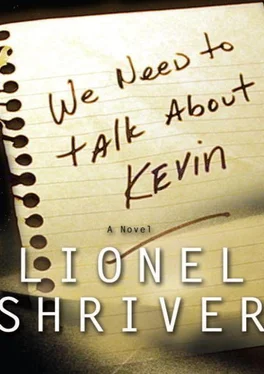“Russia,” I noted. “But I’m not, for once, threatening to ransom my life to Aeroflot. Because lately… everywhere seems kind of the same. Countries all have different food, but they all have food , know what I mean?”
“What do you call that? Right! Codswallop.”
See, you’d a habit back then of pretending to have no idea what I was talking about if what I was getting at was at all complicated or subtle. Later this playing-dumb strategy, which began as gentle teasing, warped into a darker incapacity to grasp what I was getting at not because it was abstruse but because it was all too clear and you didn’t want it to be so.
Allow me, then, to elucidate: Countries all have different weather, but they all have weather of some sort, architecture of some sort, a disposition toward burping at the dinner table that regards it as flattering or rude. Hence, I had begun to attend less to whether one was expected to leave one’s sandals at the door in Morocco than to the constant that, wherever I was, its culture would have a custom about shoes. It seemed a great deal of trouble to go to—checking baggage, adapting to new time zones—only to remain stuck on the old weather-shoes continuum; the continuum itself had come to feel like a location of sorts, thereby landing me relentlessly in the same place. Nevertheless, though I would sometimes rant about globalization—I could now buy your favorite chocolate-brown Stove brogans from Banana Republic in Bangkok—what had really grown monotonous was the world in my head, what I thought and how I felt and what I said. The only way my head was going truly somewhere else was to travel to a different life and not to a different airport.
“Motherhood,” I condensed in the park. “Now, that is a foreign country.”
On those rare occasions when it seemed as if I might really want to do it , you got nervous. “You may be self-satisfied with your success,” you said. “Location scouting for Madison Avenue ad clients hasn’t brought me to an orgasm of self-actualization.”
“All right.” I stopped, leaned on the warm wooden rail that fenced the Hudson, and extended my arms on either side to face you squarely. “What’s going to happen , then? To you, professionally, what are we waiting and hoping for?”
You waggled your head, searching my face. You seemed to discern that I was not trying to impugn your achievements or the importance of your work. This was about something else. “I could scout for feature films instead.”
“But you’ve always said that’s the same job: You find the canvas, someone else paints the scene. And ads pay better.”
“Married to Mrs. Moneybags, that doesn’t matter.”
“It does to you.” Your maturity about my vastly outearning you had its limits.
“I’ve considered trying something else altogether.”
“So, what, you’ll get all fired up to start your own restaurant?”
You smiled. “They never make it.”
“Exactly. You’re too practical. Maybe you will do something different, but it’ll be pretty much on the same plane . And I’m talking about topography. Emotional, narrative topography. We live in Holland. And sometimes I get a hankering for Nepal.”
Since other New Yorkers were so driven, you could have been injured that I didn’t regard you as ambitious. But one of the things you were practical about was yourself, and you didn’t take offense. You were ambitious—for your life, what it was like when you woke up in the morning, and not for some attainment. Like most people who did not answer a particular calling from an early age, you placed work beside yourself; any occupation would fill up your day but not your heart. I liked that about you. I liked it enormously.
We started walking again, and I swung your hand. “Our parents will die soon,” I resumed. “In fact, one by one everyone we know will start pitching their mortal coils in the drink. We’ll get old, and at some point you’re losing more friends than you make. Sure, we can go on holidays, finally giving in to suitcases with wheelies. We can eat more foods and slug more wines and have more sex. But—and don’t take this wrong—I’m worried that it all starts getting a little tired.”
“One of us could always get pancreatic cancer,” you said pleasantly.
“Yeah. Or run your pickup into a concrete mixer, and the plot thickens. But that’s my point. Everything I can think of happening to us from now on—not, you know, we get an affectionate postcard from France, but really happen-happen—is awful.”
You kissed my hair. “Pretty morbid for such a gorgeous day.”
For a few steps we walked in a half embrace, but our strides clashed; I settled for hooking your belt loop with my forefinger. “You know that euphemism, she’s expecting ? It’s apt. The birth of a baby, so long as it’s healthy, is something to look forward to. It’s a good thing, a big, good, huge event. And from thereon in, every good thing that happens to them happens to you, too. Of course, bad things, too,” I added hurriedly, “but also, you know, first steps, first dates, first places in sack races. Kids, they graduate, they marry, they have kids themselves—in a way, you get to do everything twice. Even if our kid had problems,” I supposed idiotically, “at least they wouldn’t be our same old problems… ”
Enough. Recounting this dialogue is breaking my heart.
Looking back, maybe my saying that I wanted more “story” was all by way of alluding to the fact that I wanted someone else to love. We never said such things outright; we were too shy. And I was nervous of ever intimating that you weren’t enough for me. In fact, now that we’re parted I wish I had overcome my own bashfulness and had told you more often how falling in love with you was the most astonishing thing that ever happened to me. Not just the falling, either, the trite and finite part, but being in love. Every day we spent apart, I would conjure that wide warm chest of yours, its pectoral hillocks firm and mounded from your daily 100 pushups, the clavicle valley into which I could nestle the crown of my head on those glorious mornings that I did not have to catch a plane. Sometimes I would hear you call my name from around a corner—“Ee-VA!”—often irascible, curt, demanding, calling me to heel because I was yours, like a dog , Franklin! But I was yours and I didn’t resent it and I wanted you to make that claim: “Eeeeeee-VAH!” always the emphasis on the second syllable, and there were some evenings I could hardly answer because my throat had closed with a rising lump. I would have to stop slicing apples for a crumble at the counter because a film had formed over my eyes and the kitchen had gone all liquid and wobbly and if I kept on slicing I would cut myself. You always shouted at me when I cut myself, it made you furious, and the irrationality of that anger would almost beguile me into doing it again.
I never, ever took you for granted. We met too late for that; I was nearly thirty-three by then, and my past without you was too stark and insistent for me to find the miracle of companionship ordinary. But after I’d survived for so long on the scraps from my own emotional table, you spoiled me with a daily banquet of complicitous what-an-asshole looks at parties, surprise bouquets for no occasion, and fridge-magnet notes that always signed off “XXXX, Franklin.” You made me greedy. Like any addict worth his salt, I wanted more. And I was curious. I wondered how it felt when it was a piping voice calling, “Momm-MEEE?” from around that same corner. You started it—like someone who gives you a gift of a single carved ebony elephant, and suddenly you get this idea that it might be fun to start a collection .
Читать дальше












